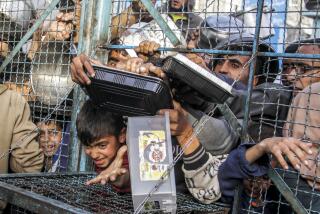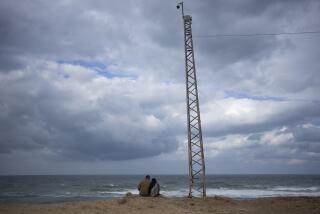Iraq violence takes toll on aid groups
BAGHDAD — First it was the curfew. Then the checkpoints and the car bombs. Later, it was the Iraqis’ fear of being seen entering a compound occupied by foreigners.
Eventually, for the U.S. nonprofit organization training Iraqi healthcare workers, the risks outweighed the returns. Iraqis couldn’t come to them. Americans couldn’t go to the Iraqis.
So to avoid working in Baghdad, RTI International moved classes to Jordan and Egypt, flying trainees back and forth.
RTI trained hundreds of Iraqis, who in turn trained thousands more when they returned to Iraq. But the hurdles they encountered along the way are typical of the challenges facing the handful of international aid and development organizations still working in Iraq.
Most groups pulled out after the 2003 bombing of the United Nations headquarters in Baghdad. Fewer than 10 remain, a minuscule number given the level of need, say those in the aid community.
And there are concerns that the number could shrink further after the killing in January of an American woman working for the National Democratic Institute, a Washington-based group that since 2003 has been helping Iraqis build their new government.
The attack was a stark reminder of the perils of aid work in Iraq, be it building sewer systems, teaching fair polling practices or tending to people displaced by sectarian violence.
At least 82 foreign and Iraqi staffers of the U.N. and nonprofit organizations, known as NGOs, have been killed since the war began in March 2003, according to the umbrella group NGO Coordination Committee in Iraq. Scores of workers have been abducted.
For aid groups, which step in when governments cannot or will not care for their people, the decision to leave can be agonizing, particularly when the crisis is growing as clearly as it is in Iraq.
After a decade of sanctions, a foreign invasion and now a civil war, Iraq is in need of everything from road repairs to security -- just drive along Baghdad’s gray and battered streets, past the concrete blast barriers, the sagging, bullet-pocked buildings and intersections guarded by gunmen.
Tens of thousands of people have been driven from their homes in the sectarian “cleansing” that followed the February 2006 bombing of the Golden Mosque in Samarra, a revered Shiite shrine. The population shifts have disrupted schools and medical facilities, overwhelming them in areas suddenly flooded with newcomers.
People’s fear of simply stepping outside has made it difficult for many to shop for food, send their children to school or visit doctors, which over time can lead to increased malnutrition, illiteracy and illness.
“If I look at how many NGOs are at work in Iraq, and I look at the violence and the threats of violence to the average Iraqis, all I can tell you is the need is huge,” said David Holdridge of Mercy Corps, an international organization with headquarters in the U.S. and Britain that has remained in Iraq.
A group’s decision to pull out usually comes after the death or abduction of an employee. Even then, aid workers wrestle with their consciences.
The New York-based International Rescue Committee left Iraq at the end of 2004 because of security concerns after an employee was kidnapped. George Biddle, the IRC’s senior vice president, said it left in part also because the humanitarian crisis anticipated early in the war had not materialized by 2004. The assistance needed then was large-scale reconstruction, which the group does not provide.
The humanitarian needs have soared since then, but so have the security risks. Choosing to stay away is difficult, Biddle said, “but if NGOs don’t feel they can go about their business, they spend all their time and resources focusing on security.”
Security is such a major concern among organizations still in Iraq that most refuse even to acknowledge their presence.
Nearly all are U.S.-based groups, and, like the National Democratic Institute, they depend on U.S. government money to fund their projects. Because of that, even those that admit to being in Iraq refuse to say where their projects or their employees are based.
Holdridge says Mercy Corps has been able to work in Iraq by never launching projects without first winning the support of local tribal and religious leaders.
However, this can require altering programs to suit the leaders, many of them Shiite Muslim clerics who have objected to, among other things, women leading computer courses. “The message was clear: Don’t cross the boundaries,” Holdridge said.
An aid worker involved in the RTI project, who declined to be identified for security reasons, said the problems the North Carolina-based nonprofit group encountered grew after the Samarra mosque bombing.
A government-imposed curfew in Baghdad after the blast made it difficult for trainees to get to their sessions on time. As violence increased, Iraqis needed to leave for home earlier to get off the streets before dark.
The growing number of car bombs and militia checkpoints scared many of them off the road altogether, as did the risk of entering the compound where the training was taking place, said the aid worker. It became virtually impossible for trainees coming from outside Baghdad to reach the city safely.
“It became harder and harder to recruit people as the situation deteriorated,” the aid worker said.
RTI says the 20-month program, which ended in December, nevertheless was a success and showed that by adjusting methods to suit the environment, aid organizations could continue their work. More than 4,600 Iraqis, from doctors to social workers, have been trained, most of them by other Iraqis who were taught by RTI.
But organizations such as the National Democratic Institute, which work closely with political groups and leaders, cannot necessarily achieve their goals from a distance.
Their ability to help Iraqis build democratic government institutions depends on regular face-to-face contact, even if that means visiting dangerous areas where the arrival of heavily guarded foreigners cannot be missed. The NDI workers were attacked after one such meeting.
A Western aid official working with another U.S. group, which has programs similar to NDI’s but fears going public because of security issues, says the organization rarely has direct contact with Iraqis anymore.
Non-Iraqi staffers only leave their compound to visit the fortified Green Zone, where U.S. and Iraqi government and military headquarters are based. Even those trips are rare. Visiting staffers outside Baghdad is impossible, as is visiting programs to gauge their effectiveness.
None of this bodes well for success in Iraq, say aid workers, who emphasize the need for their organizations to form partnerships with Iraqi communities they are trying to assist.
That means being on the ground with them, having regular contact and, in essence, being “embedded in a community,” said Sam Worthington, the president of InterAction, an alliance of U.S.-based aid organizations. “Without that being present, it makes it very difficult for reconstruction, let alone the building of a society.”
More to Read
Sign up for Essential California
The most important California stories and recommendations in your inbox every morning.
You may occasionally receive promotional content from the Los Angeles Times.











